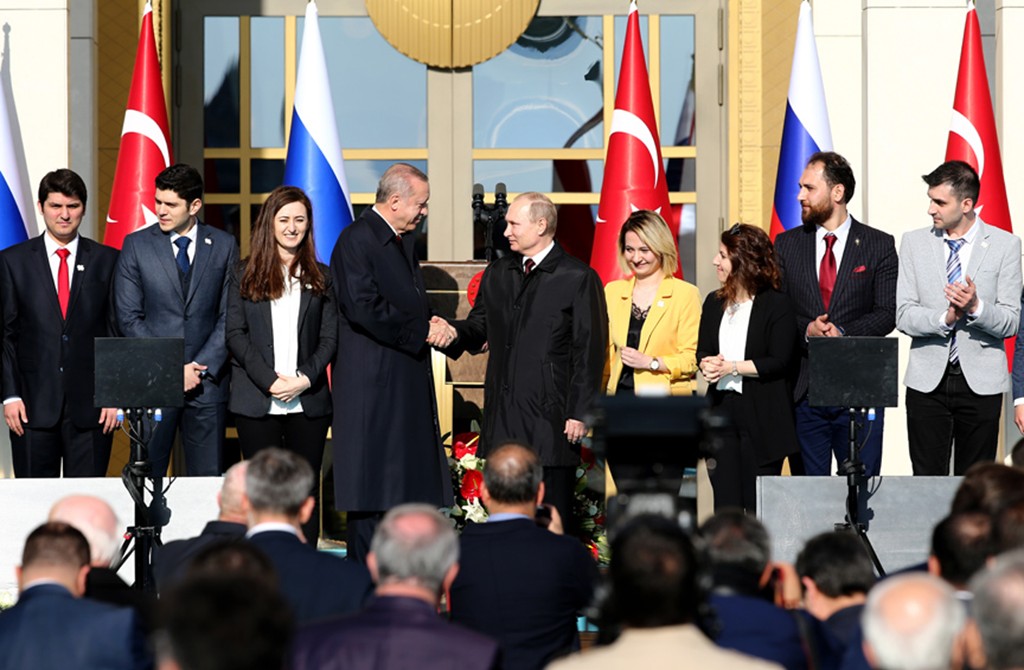It was a truly momentous event when Russian President Vladimir Putin, accompanied by eight ministers and President Recep Tayyip Erdoğan with almost his full Cabinet met at the Presidential Complex in Ankara for the groundbreaking ceremony for the Akkuyu Nuclear Power Plant. Representing a crucial manifestation of the recently intensifying strategic rapprochement between Ankara and Moscow, along with the Turkey’s decision to purchase Russia’s S-400 missile defense systems, the occasion marked a historic step in Turkey’s six-decade initiative to join the global club of countries possessing nuclear technology.
As one of the fastest-growing economies in the G20 with a recorded growth rate of 7.4 percent in 2017, Turkey is adamant to keep improving its productivity capacity, reduce costs in industrial industries and increase national export potential. All of these goals point to the critical need to ensure energy security and diversify energy sources, leaving behind coal and hydrocarbons for renewables such as solar, wind and hydroelectric in addition to nuclear energy in the complete energy mix. Therefore, as part of the national energy strategy to reduce dependency on imported resources, the country has embarked on a nuclear program that involves a series of nuclear power plants across the country.
The plant in Akkuyu, in the southern province of Mersin on the Mediterranean coast, is the first major plant with construction beginning. It will be followed by a second plant in Sinop and a third plant most probably in Kırklareli-İğneada on the Black Sea. The story of the Akkuyu plant illuminates the recent trajectory of Turkish-Russian relations as the project was commissioned to Russia’s Rosatom State Atomic Energy Corporation in 2013, but ran into repeated delays and was even halted altogether following the Turkish Air Force’s downing of a Russian jet at the end of 2015. As an omen of substantial improvement in bilateral, geo-strategic and economic relations ever since, both Erdoğan and Putin provided strong political backing for the swift completion of the project, and now the first reactor is bound to go operational in 2020.
Given the global clout and vast experience of Turkey’s construction industry in large-scale infrastructure projects, there will be local partners, as well, who will undertake the physical construction of the facility. The Cengiz, Kalyon and Kolin groups, which hold a 49 percent share in the largest single investment project in Turkish history with an estimated cost of $20 billion, are expected to create added value of between $6 billion and $8 billion for the economy. This will also translate into positive growth and employment figures. The construction phase of the project will generate employment for 10,000 individuals and the operation phase will require around 3,500 personnel, including highly skilled engineers and technicians. Hundreds of technical personnel who will undertake crucial responsibilities at the plant have already started intensive training in Russia, which will also contribute to the updating and teaching of critical know-how on nuclear technology in Turkey by educating vital human resources.
The Akkuyu plant will have four nuclear reactors each with a production capacity of 1,200 megawatts, for a total of 4,800 megawatts, which corresponds to 10 percent of Turkey’s electricity demand. From a different angel, Akkuyu represents the first nuclear plant Rosatom will build on the basis of a build-operate-transfer (BOT) scheme outside Russia, which is indicative of the high-level of trust in Turkey’s future political stability and economic growth potential on the part of the Russian administration.
Akkuyu will lead the way in Turkey’s quest to enter the global league of countries possessing and utilizing nuclear technology, and it will soon be followed by two more nuclear plants. The intergovernmental agreement has already been signed for the construction of the Sinop nuclear power plant with a production capacity of 4,480 megawatts and an estimated cost of around $16 billion by a Japanese-French consortium. It is highly probable that the preparatory processes will speed up for the construction of a third nuclear plant in the Kırklareli-İğneada region by a consortium including Chinese state companies and the Westinghouse group from the U.S.
Provision of cheap and secure energy both for the public and private market constitutes a vital lifeline for international competitiveness in the age of globalization. Given that proper security measures for human and environmental safety are accomplished, competence in nuclear technology is perceived as a major element of energy security. Therefore, Turkey’s entrance into this elite field of global competition as a predominantly Muslim country currently holding the presidency of the Organisation of Islamic Cooperation (OIC) is to be commended.
[Daily Sabah, 7 April 2018]


